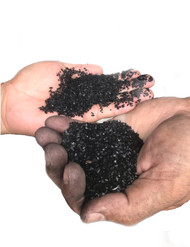Activated Carbon Filter in Masks
6th Feb 2023
What is activated carbon?
Activated carbon is an absorbent that is useful in many applications. It is sometimes called activated coal, active carbon, or charcoal. It has several properties that make it popular in industries such as cosmetology, automotive, industrial gas purification, precious metal recovery, food-grade products, and water purification. These properties include:
- High surface area
- Pore structure (micro, meso, and macro)
- A high degree of surface reactivity
The base materials used to create activated carbons come from coal, wood, or coconut shells. It is commonly used to purify, dechlorinate, decolorize, and deodorize both vapours and liquids. Activated carbon is well-known to be the world's most powerful absorbent and eco-friendly due to its regenerative nature. Its properties make it incredibly effective as a face mask filter, allowing it to give wearers like welder’s cleaner air to breathe.
What are the types of activated carbon?
There are five main types of activated carbon. Each is suited for specialized applications based on its grade and size. When choosing the right type, it is essential to establish the application and the contaminants you are trying to remove. The five types are:
- Catalytic
- Impregnated
- Granulated
- Pelletized
- Powdered
Catalytic activated carbon removes hydrogen sulphide and chloramines from drinking water.
Impregnated activated carbon is chemically modified through the distribution of chemicals and metal particles on the pore's internal surfaces. The goal is to enhance its absorptive capacity. It is commonly used to remove impurities from gas streams, and silver-impregnated carbon is used to purify water systems.
Granulated activated carbon is made from organic materials like coconut shells or coal. It is most typically used for fixed bed applications of water purification.
Pelletized activated carbon is also made from coconut shells or coal and may be made from wood. It has a low ash content, large surface area, chemical stability, and extended pore volume. Therefore, it is the ideal form of activated carbon for vapor phase application. It can remove a variety of air and gas stream contaminants.
The activated carbon used in the filters of face masks you can purchase from a retailer is commonly made from charcoal.
How does it work?
When used in face mask filters, activated carbon works through a straightforward process. Although simple, it is highly effective because the pores and surface area of the carbon filter remove chemicals and contaminants. At the same time, the air compounds react with that carbon allowing it to stick to the surface. As air enters and hits the face mask surface, particulates are trapped in the first layer, and unfiltered organic vapours are attracted to the mask's filter. The activated carbon absorbs the vapours at a molecular level, removing viruses, bacteria, odours, and gases below exposure limits.
That means the air you take into your lungs is cleaner and means less exposure to harmful chemicals and the potential for illness. This is also very helpful for those who work around odorous materials that not only smell bad but can cause light-headedness, headaches, and dizziness with prolonged exposure. That is especially true for those who work in welding.
Types of filter protection
Depending on the application you are using the filter for, you can choose between reusable face masks with filters, FFP3 respirator masks, and those that are valved or unvalved. If you work in the welding industry, using an FFP3 with a built-in activated carbon layer and valve is the best choice. A valve will reduce heat and humidity inside the mask, especially when hot materials are involved.
It is recommended to use a carbon filter in conjunction with particulate protection. This will protect the air you breathe from particulates that can enter the lungs and filter out nuisance level vapours like when welding galvanized steel.
Head over to our site and search carbon layer mask to find the right requirements.



